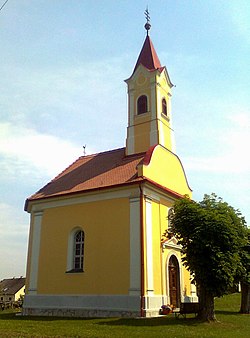Langegg bei Graz is a former municipality in the district of Graz-Umgebung in the Austrian state of Styria. Since the 2015 Styria municipal structural reform, it is part of the municipality Nestelbach bei Graz.[2]
Langegg bei Graz | |
|---|---|
 Donatus chapel in Langegg | |
 Location within Graz-Umgebung district | |
| Coordinates: 47°03′36″N 15°38′06″E / 47.06000°N 15.63500°E | |
| Country | Austria |
| State | Styria |
| District | Graz-Umgebung |
| Area | |
• Total | 11.34 km2 (4.38 sq mi) |
| Elevation | 490 m (1,610 ft) |
| Population (1 January 2016)[1] | |
• Total | 833 |
| • Density | 73/km2 (190/sq mi) |
| Time zone | UTC+1 (CET) |
| • Summer (DST) | UTC+2 (CEST) |
| Postal code | 8323, 8302 |
| Area code | 03133 |
| Vehicle registration | GU |
| Website | www.langegg-graz. steiermark.at |
Population
edit| Year | Pop. | ±% |
|---|---|---|
| 1869 | 707 | — |
| 1880 | 735 | +4.0% |
| 1890 | 734 | −0.1% |
| 1900 | 740 | +0.8% |
| 1910 | 746 | +0.8% |
| 1923 | 706 | −5.4% |
| 1934 | 757 | +7.2% |
| 1939 | 710 | −6.2% |
| 1951 | 715 | +0.7% |
| 1961 | 671 | −6.2% |
| 1971 | 692 | +3.1% |
| 1981 | 697 | +0.7% |
| 1991 | 732 | +5.0% |
| 2001 | 786 | +7.4% |
Notable people
editJohann Joseph Fux: music theorist known for Gradus ad Parnassus, an influential treaty on counterpoint. He was born in Langegg bei Graz in 1660.
References
edit

